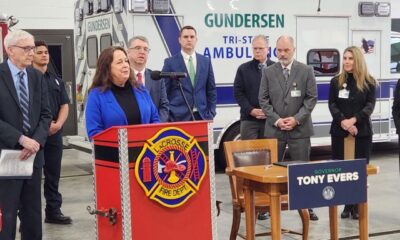Coronavirus
New report shows economic impact of COVID-19 on Wisconsin agriculture, communities and economies

After compiling data and anecdotes, the Wisconsin Economic Development Corporation released Wisconsin Tomorrow in collaboration with state agencies to outline the diverse, significant impacts of COVID-19 on Wisconsin’s communities and economy.
Included in the report is a plan to establish opportunities for providing support to major industries, according to Wisconsin Department of Agriculture Secretary-Designee Randy Romanski.
“DATCP was really proud to contribute to this report,” Romanski said. “The three major goals were reskill and up-skill workers to get them back to work, offer accessible, affordable, and quality broadband throughout Wisconsin, and number three support innovation to help pivot plan adapt or change operations as we all work to respond and recover from COVID-19.”
Romanski pointed to the fact that Gov. Tony Evers’ budget provided $48 million in broadband expansion grants, which have become vital as more people than ever are working from home and attending school from home.
“For our agency, we remember and promote on a regular basis that agriculture is part of the foundation of our state, a cornerstone of the economy and essential to our well-being,” Romanski said. “It has a $104.8 billion economic impact in the state. About one in nine jobs in Wisconsin is related to agriculture. That connection to accessible and quality broadband services is vitally important.”
Some of the key agriculture recommendations included investment and innovation would be critical to expanding processing availability for farmers and ensuring food safety and accessibility across the supply chain, according to Romanski.
The Wisconsin Tomorrow report outlined losses reported by agricultural organizations in a letter to Evers in mid-April. Dairy and milk lost $66 million, pork lost $44.4 million, beef up to $200 million, potatoes $100 million, cranberries $31 million, soybeans up to $100 million, and corn $144 million.
“Nobody could have foreseen the impact that COVID-19 was going to have on our state’s economy,” Romanski said. “The dramatic supply chain disruptions that the agriculture industry faced were dramatic. We heard from the group’s early and often that this was going to be a substantial impact. You’re talking about hundreds of millions of dollars.”
He said an important lesson learned was to work together with the industry on a state and federal level as well as consumers to effectively respond. Romanski was optimistic for the start of the United States-Mexico-Canada trade agreement (USMCA) that went into effect July 1 and the role it can play for Wisconsin agriculture and COVID-19 recovery.







